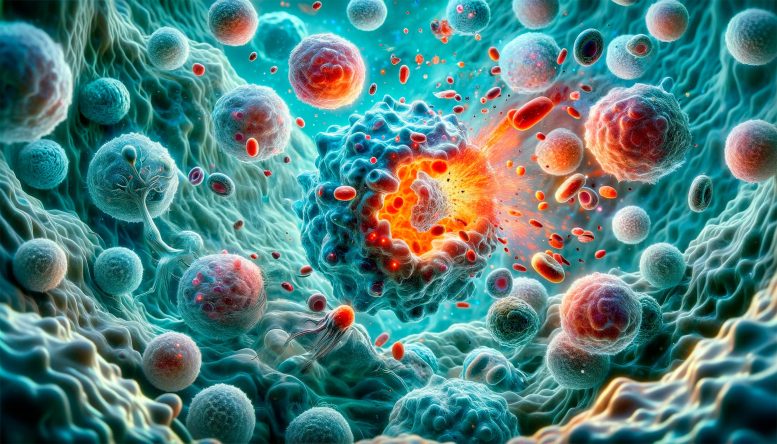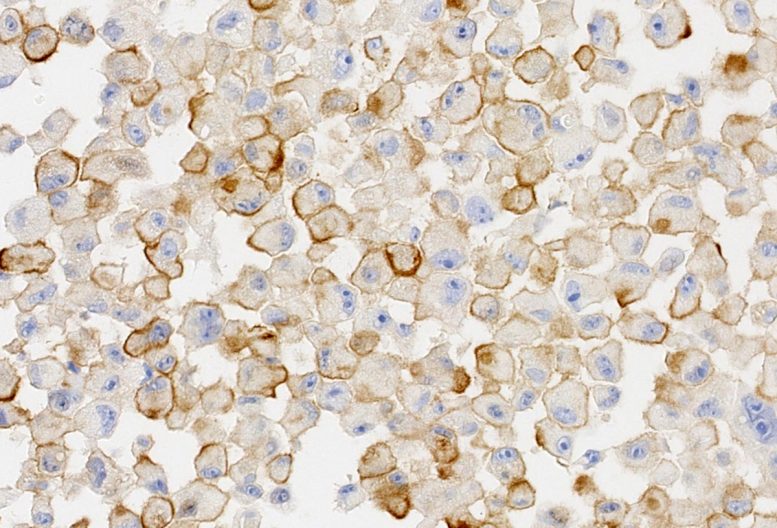
Research led by Dr. Manuel Serrano at IRB Barcelona has unveiled how senescent cancer cells, post-chemotherapy, employ the PD-L2 protein to evade immune detection and foster a suppressive environment, hindering lymphocyte function. Deactivating PD-L2 in these cells allows the immune system to efficiently eliminate them, enhancing the effectiveness of chemotherapy. This finding, demonstrated in cell and animal models of various cancers, suggests the potential of PD-L2 inhibitors in improving cancer treatments. Credit: SciTechDaily.com
A study reveals that blocking the PD-L2 protein in senescent cancer cells post-chemotherapy boosts the immune system’s ability to destroy these cells, potentially enhancing chemotherapy’s effectiveness against cancer.
Cancer treatments, including chemotherapy, in addition to killing a large number of tumor cells, also result in the generation of senescent tumor cells (also called “zombi cells”). While senescent cells do not reproduce, they do, unfortunately, generate a favorable environment for the expansion of tumor cells that may have escaped the effects of the chemotherapy and eventually result in tumor regrowth.
An international team of researchers led by Dr. Manuel Serrano at IRB Barcelona has described how cancer cells that have become senescent after chemotherapy activate the PD-L2 protein to protect themselves from the immune system while recruiting immune suppressor cells. The latter creates an inhibitory environment that impairs the ability of lymphocytes to kill cancer cells.
Based on these findings, scientists wondered what would be the effect of inactivating PD-L2. Interestingly, senescent cells lacking PD-L2 are rapidly eliminated by the immune system. This intercepts the capacity of senescent cells to create an immunosuppressive environment and, as a result, lymphocytes retain their full capacity to kill those cancer cells that may have escaped the effects of chemotherapy.

Senescent human melanoma tumor cells. In brown, the PD-L2 protein acts as a protective shield and prevents the action of the immune system. Credit: IRB Barcelona
“By blocking PD-L2 in mouse models, we have seen that chemotherapy is more effective against cancer. This finding paves the way to consider the use of a potential PD-L2 inhibitor as an adjuvant in the treatment of this disease,” explains Dr. Manuel Serrano, currently at Altos Labs (Cambridge, United Kingdom).
The study has been done using cell lines and animal models of melanoma, pancreatic, and breast cancer.
Senescence — A Common Phenomenon in Cancer Therapies
Cellular senescence is a process that occurs naturally during aging and it is common in the context of cancer therapies. Most of these treatments (such as chemotherapy and radiotherapy) act by causing extensive cellular damage and, as a result, bring about senescent cells, particularly within the tumor. The team of scientists will now study whether senescent cells linked to the aging of the organism also exhibit elevated levels of PD-L2.
“Although more experiments are needed to characterize the role of this molecule in different types of human cancers, this work has enhanced our understanding of the role of PD-L2 and the interaction of senescent cells with the immune system,” explains Dr. José Alberto López, a postdoctoral researcher from the same laboratory and first author of the work together with Dr. Selim Chaib. In 2024, Dr. López will be starting a new laboratory at the Salamanca Cancer Research Center, a joint endeavor between the University of Salamanca and CSIC. Dr. Chaib is now at the Mayo Clinic, in Minnesota (United States).
Reference: “The efficacy of chemotherapy is limited by intratumoral senescent cells expressing PD-L2” by Selim Chaib, José Alberto López-Domínguez, Marta Lalinde-Gutiérrez, Neus Prats, Ines Marin, Olga Boix, Andrea García-Garijo, Kathleen Meyer, María Isabel Muñoz, Mònica Aguilera, Lidia Mateo, Camille Stephan-Otto Attolini, Susana Llanos, Sandra Pérez-Ramos, Marta Escorihuela, Fatima Al-Shahrour, Timothy P. Cash, Tamara Tchkonia, James L. Kirkland, María Abad, Alena Gros, Joaquín Arribas and Manuel Serrano, 24 January 2024, Nature Cancer.
DOI: 10.1038/s43018-023-00712-x
This work has been carried out in collaboration with the groups led by Drs. Joaquín Arribas, Alena Gros and María Abad at the Vall d’Hebron Institute of Oncology (VHIO). Dr. Arribas is now the director of the Hospital del Mar Research Institute (IMIM) and Dr. Abad works at Altos Labs. The team led by Drs. James Kirkland and Tamara Tchkonia at the Mayo Clinic contributed important data to this study. This work has also involved the company Rejuveron Senescence Therapeutics, which is developing antibodies against PD-L2 for clinical use and has central offices in Zurich and Barcelona.
This work has received funding from the Spanish Association Against Cancer, “la Caixa” Foundation, BBVA Foundation, the Spanish Ministry of Science and Innovation, the Ministry of Research and Universities of the Generalitat de Catalunya, the European Research Council (ERC) and ERDF European funds.









Be the first to comment on "Supercharging Chemotherapy: Eliminating “Zombie” Cells To Beat Cancer"